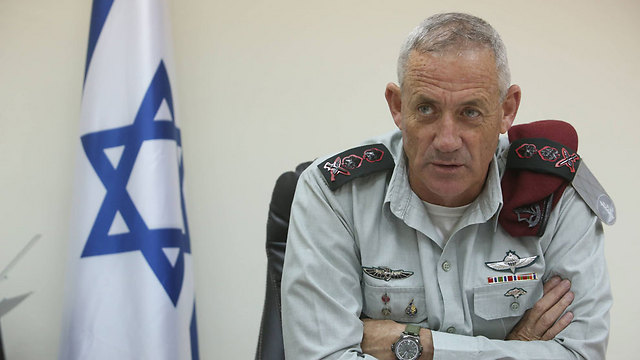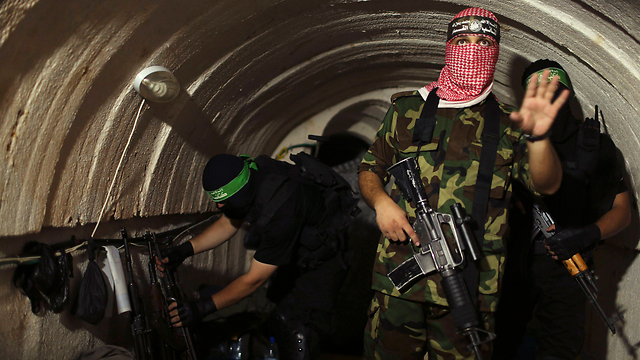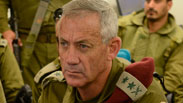
'IDF won international praise for conduct of Gaza operation'
In his first interview after Protective Edge, IDF Chief of Staff Benny Gantz says Hezbollah doesn't want another all-out war, there's no momentum for a third Palestinian intifada and ISIS is 'a phenomenon that must be tackled'; he won't, however, be drawn on the issue of Iran.
Almost the only moment during the interview with Israel Defense Forces Chief of Staff Lieutenant General Benny Gantz at which his easy-going and measured tone of voice climbed an octave or two was when it came to criticism of the way in which the IDF operated and was managed during Operation Protective Edge.
"Since the operation, we've already had visits from a great many officers from armies around the world," rose the chief of staff's voice, "and they say to us: What you did in this combat operation, your professional performance, is unprecedented."
Are you talking about senior US military officers who came to Israel to study the debriefings?
"Yes, and not only from the United States. We set standards for them that they don't know how to handle. They tell us it was an extraordinary operation carried out by our brigade-level combat teams – a multi-corps operation in complex terrain, with very praiseworthy tactical subterfuge. And they aren’t the only ones who say it was unprecedented. The same has been said by local heroes, not foreigners, on whose battle heritage we all grew up; and I won't mention their names as I didn't ask their permission to do so.
"You should have heard the admiration with which they spoke of the way in which the IDF operated during Protective Edge. We emerged victorious from the operation, yet we are still going to conduct probes into everything that went on there, and that includes the best air force in the world too. Every move will be investigated. Dozens of teams are already busy doing so."
So where does that bitter taste in the mouth that the operation left in its wake come from? Cabinet members and ministers have spoken of the army's unimaginativeness, a lack of creativity. Do you disdainfully reject that criticism?
"I don't disdainfully reject anything. I don't use such terms. What we need to do is to act responsibly and professionally, and not in keeping with the needs of the street. I don't open Facebook to make my decisions, and I don’t publicize them on Facebook. I work in a professional manner, with assessments of the situation; I examine the alternatives and determine the course of action."
The blunt allusion to Facebook – which could be viewed as criticism of something or someone within the political echelon – is out of character for Gantz. In his book, there's no questioning the authority of his superiors. Immediately on taking office, he stipulated that whenever appearing before the political decision-makers, the officer presenting the issue at hand must stand – and not so that they can hear him better.
"Yes, when we are sitting in the room and the prime minister walks in, we stand up," he says. "And yes, when we speak, we do so while standing. We address the cabinet with respect. That's our ethic."
Gantz, the man, is a style unto himself. If at some point in the future someone were to look for the mark he left on the IDF, they would find, first and foremost, decency, integrity and openness – traits that are not always a given in the military establishment. At his first pow-wow with the army's battalion and squadron and fleet commanders, the chief of staff demanded – almost to the point of issuing an order – that they speak openly with him and their superiors, to voice whatever is on their minds all the time. And he's got their back too – just like in the recent war.
Perhaps this openness has gone too far? Perhaps there really were officers who, unauthorized, briefed cabinet ministers during Protective Edge?
"We've conducted our inquiries and it's not what you think. There are people who had conversations with various people. I looked into it and we put the matter to bed, but I don't want to go into details. I run this army."
The army under his baton, as far as Gantz sees things, turned Protective Edge into a success story; but the chief of staff makes it clear that he emerged from the fighting in Gaza with several lessons in hand.
"Already now, for example," he says, "we need to find a solution for the short-range fire on the Gaza-border communities. And there are also the fundamental lesson that will still be learned – like the duration of the campaign, 50 days, and the implications of such a long period of combat."
Did you assess before the operation began that it would take so long, that it would go on for 50 days?
"No, we thought it would take less time."
At this point, the chief of staff goes into an explanation about the differences between "a campaign using firepower" and a campaign that also includes ground maneuvers. While the first takes longer but exacts fewer victims, the second reduces the duration of the fighting but exacts a high price in human life. In Protective Edge, he says, in addition to these two types of campaigns, there were also a number of "waiting days" – the ceasefire days. The fighting was further extended by Israel's adamant standpoint vis-à-vis the demands it placed on Hamas during the operation.
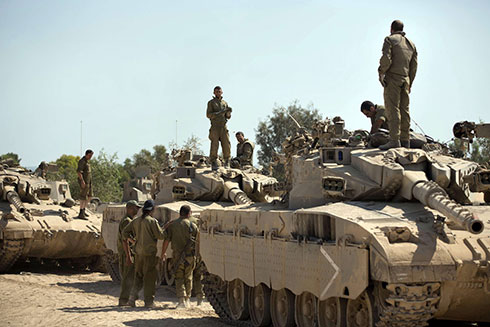
"The government made the right decision not to forgo its demands, and these things come with a time cost," Gantz says. "Am I pleased with the fact that the campaign went on for 50 days? The answer is no. We need to find a way to shorten these things. But that's a good question only in retrospect."
Is it true that you supported the first ceasefire despite knowing that we had yet to deal with the tunnels?
"I'm not getting into things I said in the cabinet. What difference does it make what I said before the ceasefire? In the end, a cabinet decision was made – the correct one, in my opinion. There was room to respond to the calls for a ceasefire, and that also includes the first ceasefire, which would have left behind an inactive potential threat. At that point in time, we had made massive offensive achievements.
"If a ceasefire had been accepted then, the fighting would have ended with us having prevented terror attacks that were supposed to have taken place in the Gaza-border communities. The moment it wasn't accepted, it was clear to us that there wouldn't be any more talks about a ceasefire with the other side for at least two more weeks."
You already knew at that stage that there were tunnels crossing the border, an outright breach of sovereignty. So why didn't you come to a decision to act against these tunnels earlier?
"By the same token, you could ask why we didn't re-occupy the Gaza Strip a year and a half ago, when we discovered the invasive tunnels. After all, it was already clear to you, and me, and the cabinet, and to the Knesset Foreign Affairs and Defense Committee, and to the people of Israel at large, that such tunnels existed. One can always come along and say: Let's be the ones to initiate a military campaign. But one embarks on broad operations when needs be. Here we had a situation of the time had come, that we needed to, and so we embarked on the campaign."
Were you aware of the operative significance of those tunnels?
"Certainly."
Was the political echelon aware of it too?
"Yes, I think so."
The cabinet members, the members of the Foreign Affairs and Defense Committee – were they all familiar with this threat?
"Yes, I believe so."
So what are you saying – that they were aware but ignored your warnings?
"They didn’t ignore the warnings. Look, guys, based on your questions, I suggest we part ways here and now, and I'll rush off to Jerusalem and recommend an assault on Lebanon."
Why? Are there tunnels there?
"The threat posed to the citizens of Israel from Lebanon, after all, is far broader than the one from Gaza; so I suggest that we don't wait for something to happen, and let's initiate a war. Is that what we should do? I assume that you, too, don't think we should conduct ourselves like that. We have to know how to manage risks. It's not a stock market in which managing risks means losing money. Here, if we mismanage the risks, people die.
"Prior to Protective Edge, I, personally, along with the head of the Southern Command, the commander of the Southern Brigade and the commander of the Egoz unit, spent long days and nights at Kerem Shalom. Why did we do so? Because we're neglecting things? Because we don't take things seriously? Or because it's our job to manage the risks and adapt our actions to assessments of the situation at any and every given point in time?"
So why at the very outset of the campaign did you not take the opportunity to carry out a limited tactical strike against the tunnels?
"When the campaign started, we prepared the forces for dealing with the tunnels. But from then on, it's a matter of strategic, political and security maneuvering in terms of what you do, when you do it, how much and why. At this point, you need to decide if it is going to happen on this day or the other. It's part and parcel of the strategic maneuvering.
"In retrospect, I say to you, with all the pain it evokes: The ones in the end who encountered the threat of the tunnels were the IDF soldiers – and it's a good thing they did, despite the cost – and not the residents of the south. We invested all our efforts into defending the south. All the fallen soldiers from the ground offensive were killed in the defense of the communities of the south."
And when you did decide to go in to deal with the tunnels was the army ready for the task?
"Yes, relatively so. We still have gaps to fill. We had thought about various methods but ended up having to use others. There will always be things you need to complement in real time or plans you need to broaden. That's the nice thing about war – that it doesn't go ahead only as planned."
To pass the buck and to vilify
In keeping with the scenario under which the IDF has been operating over the past decade, the military is capable of facing up to threats to Israel on two and a half fronts simultaneously. And under this scenario, and in keeping with the resources at its disposal, the IDF constructs its force.
But when it came to Protective Edge, not only did the campaign last almost twice as long as expected, the amount of ammunition the IDF consumed during the course of the operation led to a depletion of stocks. And all this happened on just a single front, giving rise to a sobering thought: Where would we be now if, God forbid, an all-out conflict were to break out on several fronts?
You used up most of the ammunition on a single front – and not the principle one. Who was responsible for managing this economy? Was the political echelon aware of this?
"The extent of the ammunition at our disposal was known to those who needed to know among the political echelon. And just so you know we reviewed the matter during the course of the campaign and we saw that we were indeed using a lot. But we also examined the probability that we'd have to make use of this ammunition elsewhere; and we came to the conclusion, taking a calculated risk, that it would be best to continue the campaign at the required rate of fire."
In 1973, too, exactly 41 years ago, risks were taken, and it turned out in the end to be a conceptual error. Did you consider and prepare for the possibility that you may be wrong and that an additional front could open up?
"The answer is yes… Do you really think we are playing checkers here – that we don't take into account the possibility of a deterioration in the situation, even though we believe that (Hezbollah leader Hassan) Nasrallah has no plans to attack us? And how do we know that he has no intentions of making a move? Because we have intelligence!
"It is my job to make decisions under conditions of uncertainty. You know that you don't know everything, yet you need to make decisions. My decisions determine whether people live or die. That's what I've been doing for 37 years. And I think that in the end we made the right considerations and did the right things."
Were you hesitant when it came to the use of the ground forces and reserve soldiers in Protective Edge?
"No."
Were the ground forces sufficiently prepared for the fighting?
"Yes."
So why wasn't the ground operation implemented to the extent that it could yield clear results?
"What do you mean wasn't implemented? It was implemented as it should have been. Whatever we wanted to do, we did."
.jpg_wa.jpg)
Let's go back to the criticism heard during the operation from cabinet ministers who spoke about a chief of staff who didn't push for or initiate ground operations. Was there a specific course of action that you suggested and they blocked you?
"We took a sober look at the challenges that this campaign posed. We chose to deploy reserve force in certain areas and to carry out the operations in the Strip primarily by means of the regular army. We were ready to expand the reserve forces; some of the commanders had already been called up and were preparing to do so. Throughout the campaign, we analyzed the needs, we presented operational alternatives to the political echelon, and we recommended doing what we considered the right thing to do. We didn't pass the buck, and I am very pleased that our recommendations were upheld. I think that we did the right thing. If people choose to pass the buck and vilify, good luck to them. I don't behave like that."
On August 5, a 72-hour ceasefire was declared. Some 30,000 reservists were released, the heads of the army and the state called on the residents of the Gaza-border communities to return to their homes, and you made your speech about the anemone flowers. What happened there? An assessment error?
"The assessment of the situation was just fine. We released reservists both to spare resources and also to release people who had been on reserve duty for extended periods of time. Our assessment of the situation at the time included a scenario in which the fighting would resume."
So why did you tell the people to return?
"In my speech, I spoke in future terms – and not necessarily in terms of here and now. I said the same things about the future of the Negev in the army too, before the start of the ground maneuvers. I presented the picture as I see it after the campaign, when everything is over. People remember the anemone flowers but not the sentence that came afterwards and in which I said that the IDF isn't going anywhere and that the IDF will continue to defend, operate and attack when required."
Do you regret the speech?
"No, I don't regret it. But do I hurt because other people are hurting? Of course it hurts."
MK Omer Bar-Lev revealed this week that according to a statement from the IDF Spokesman's Office, the Air Force attacked some 900 command and control centers in Gaza. Nevertheless, Hamas' command and control network held out until the very end. What does this mean? That the intelligence was lacking? That the aerial attack was insufficiently effective?
"It means that we have excellent intelligence that locates a very large number of targets and that can grow from 1,250 targets at the start of the operation to 5,000 targets during the course of it. But to your question – what we learned is that the enemy we confronted operated in a decentralized fashion, prepared infrastructure in advance, and gave itself the ability to hold out for relatively long.
"It constructed itself well in order to survive in this type of combat. I think on the one hand that it's impossible not to admire its fortitude. On the other hand, this doesn't say a thing about our intelligence, just like it doesn't say anything about the effectiveness of the aerial operation, which is fantastic."
So if the intelligence is fantastic and the Air Force is fantastic, perhaps our combat doctrines aren't good enough?
"Our operational outlook is particularly relevant. Let me remind you again of what officers from the worlds' armies said about it. Nevertheless, we are conducting a review of the operational outlook too."
What about the order issued by Givati Brigade commander Colonel Ofer Winter, who wrote to his soldiers that the campaign is being waged "against an enemy that blasphemes the God of Israel?" Did you like that?
"Winter's order came from the recesses of his heart. I think that in the end every one of us writes what he believes in. It's natural. But I also think that the commanders need to rein themselves in a little – in other words, to know that they don't include only what they believe in, but additional things too. All in all, Ofer did very many good things, and I wouldn't turn that story into something that it isn't."
Military officials, particularly during periods of budget struggles, find it a little hard to speak about Israel strategic situation in positive terms. After all, scaremongering and threats mean money. But the chief of staff declares in no uncertain terms that Israel's security situation at the start of the Jewish New Year is better than it was at the start of the previous one.
Gantz's satisfaction begins with the northern border. "As I see it, Hezbollah doesn't want to get into an all-out conflict again," he says. "It understands the cost of the war; it's deterred."
Nevertheless, is Israel ready from a military point of view for a situation in which the organization begins firing 1,000 rockets a day at the country?
"I am very concerned about the resources that are lacking for defense. I think that the gaps are very big. If we don't make sure that the people and the stocks are in good shape, we'll be asking a lot more questions: Why didn't we do this and why didn't we do that?"
When it comes to the Syrian arena, Gantz doesn't foresee the fall of President Bashar Assad in the coming year. "On the other hand," he says, "he won't be able to reclaim the assets he has lost; ISIS has taken control of one-third of Syria, the al-Nusra Front is occupying the Golan Heights. The stream of refugees from the country and the influence of ISIS could also project onto Jordan and end up having an effect on us too, along the length of the Arava and the length of the Jordan Valley. This requires our close attention."
And what about the south?
"The Sinai is awash with terrorists, but the Egyptian regime is fighting them more so than in the past – and more effectively too. And in Gaza, meanwhile, a good foundation has been laid for long-term achievements, which are dependent not only on the deterrence created by Protective Edge but also on the arrangement put into place."
But there is no arrangement yet.
"The fighting didn't stop as a result of a unilateral move. It's an open ceasefire, without restrictions, that also firmly anchors our achievements in terms of deterrence. Alongside the risks, there are no few opportunities in the region in the coming year. I view the world's action against ISIS as very significant; what remains to be seen is how far it will go. Furthermore, there's no doubt that Jordan is our partner today, and Egypt too."
But there's also a low point. The direct talks with the Palestinians are on ice. Netanyahu's and Abbas' speeches at the UN put paid to them. Do you foresee a flare-up in Judea and Samaria as a result of the freeze?
"We follow the developments in the peace process, and live in keeping with their implications; but at this point in time, I don't see any momentum towards a third intifada. Naturally, there is always potential for a flare-up when there's a disconnect; but we, as an army, don't tell the political echelon what to do."
What are your assessments regarding ISIS? Are we not overstating this threat?
"It's not a matter of overstating. ISIS represents a phenomenon that must be tackled. The Sykes-Picot arrangements, which determined the national borders in the region after World War I, are dead and buried. It's the end of an era. Someone else is determining the borders in our expanse, and this someone doesn't recognize any political institution. Its methods aren't ones of the bombing of countries and the destruction of infrastructure, but rather shock and horror, of severed heads."
Like Genghis Khan established the Mongolian Empire.
"Honestly, I've heard people around me use the expression that we're up against a Mongolian snowball. This phenomenon must be stopped. They can be dealt with, and it's being done."
Are we in the picture too? Are they talking to us – behind the scenes at least?
"They speak to us about everything. After all, we like to talk."
When Gantz is asked if he views Iran as the No. 1 existential threat to Israel, he chooses to evade the issue. He won't be easily pressed into voicing such a declaration, which the political echelon tends to use overly freely. This could perhaps be an indication of where on the field of play – for or against an attack – the chief of staff stands.
"There are significant processes underway there, both internal ones and in cooperation with the international community," he says. "But I think Iran has yet to relinquish its vision of becoming a nuclear military force; we need to continue to monitor the situation."
Have the brakes been put on the nuclear-military production processes? Is the process more supervised now?
"There's a process of dialogue."
And containment?
"Yes. But I told you, Iran hasn't relinquished its vision. It hasn't forgone its support for the radical axis and the terror organizations. There's Rouhani's Iran, and there's the Iran of Qasem Soleimani (a senior Revolutionary Guard commander)."
We've invested vast sums of money in efforts to contain the Iranian nuclear program. Under the current circumstances, is this investment still justified?
"We need to be able to operate at any range, anywhere and everywhere, and to be flexible when it comes to the scope of our actions. Without going into details, I can say that the majority of the investments are recouped in other arenas too."
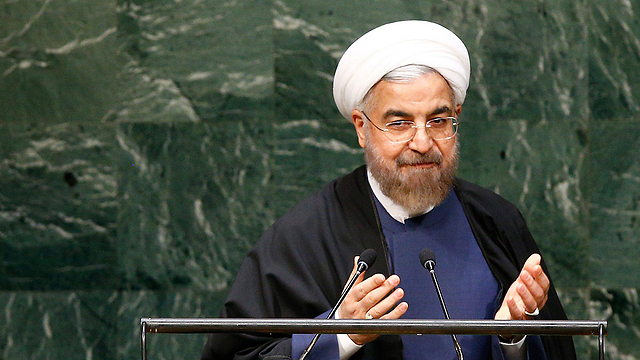
Considering the fact that there are quite a few military experts who argue that Israel shouldn't be the one to take military action against Iran, why then have we invested so much money in expensive systems? Former prime minister Ehud Olmert has spoken of investments to the tune of NIS 10 billion.
"The IDF must maintain operational capabilities in keeping with the directives it receives. And that's what we are doing."
Do you think there was any justification for investing in a sixth submarine, which cost almost half a billion euros?
"Yes, we will make use of everything we have purchased. We will have these submarines for the next four or five decades."
Can the same be said regarding the acquisition of the F-35 fighter planes?
"Certainly."
Huge damage, a near disaster
Gantz has much praise for Israeli society at the outset of the New Year, noting that it demonstrated unity, firm support and solidarity towards the IDF soldiers over the past year. But all his praise refers only to the last portion of the year, the portion that began with the abduction of the three teenagers in Gush Etzion and culminated in the operation in Gaza. When it comes to the period before then, which was characterized by criticism of the defense budget, Gantz has harsh words to say.
"Take for example the way in which the career soldiers were portrayed then on Eretz Nehederet (a satirical television show)," says the chief of staff. "Eretz Nehederet was close to the hara-kiri that Israeli society performed on itself. What after all does this show do? It adopts what society wants to hear, and retells it in a satirical fashion – in the very same way the media writes what society wants to hear.
"And I come and say that Israeli society almost committed suicide and sacrificed that thing called the IDF. It started with: 'What's going on here? You're freeloaders! I pay for the fuel for the car in which you came to the supermarket.' That's how they spoke about the career soldiers over a period of several months. Today, things have been reversed. Now they're saying to the man in uniform: 'Come, go ahead of me in the line, please.' And all of this occurred in the same year."
Did the permanent force army suffer any damage as a result of the attitude of Eretz Nehederet, the public?
"Huge damage, huge; we experienced a near disaster last year. Large numbers of career soldiers could have left the army. If in the coming year the defense budget fails to offer a solution, people won't remain in the army. Like we've already seen in our technological departments – people get paid three and four times as much on the outside, and they're leaving."
So does the current agreement on the defense budget fail to meet the demands too?
"Once again, we've been presented with a budget that shows that the State of Israel has again gone for a list of priorities that places the army up against a tough challenge. I am very concerned about this. If we don't have the resources to maintain fighting fitness, to replenish stocks and do everything we need to do, we face a big problem. You yourselves spoke about the country's need to deal with a number of fronts simultaneously."
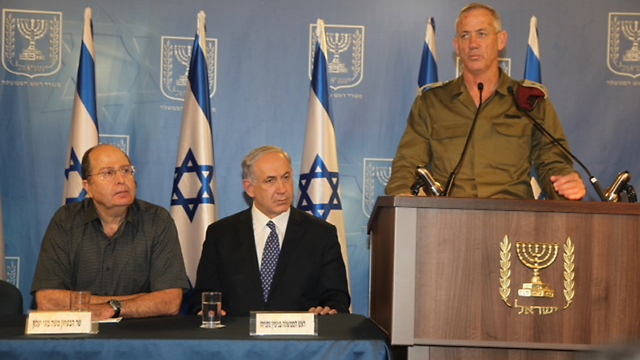
The finance minister and prime minister agreed on significant additions to the defense budget over the coming two years. Are they insufficient?
"It's an exact repeat of what took place the previous year. And again it means an undermining of our readiness to combat threats. I am not satisfied. Moreover, I am very concerned about this arrangement."
Despite the budget battles, Gantz is about to become the first chief of staff in a long time – after three predecessors – who will end his term in office in a normal fashion – without confrontations and without blow-ups. He has the confidence of the public at large – and no less importantly, he has the admiration of the political echelon. The man who will step into his shoes in February 2015 will, Gantz says, be getting a worthy bequest. "I'm leaving a very good army to the man who will replace me – a highly professional army and a highly moral army, internally and externally."
In this context, the chief of staff can't understand why people always expect him to create a scene and threaten to quit in order to get what he wants. As he sees it, there's almost nothing he has wanted that he hasn't managed to obtain, without conflict. "Let's review the recommendations I submitted to the government, on the issue of the budget too," he says. "Most of them were accepted in the end."
And does this also include the army's recommendations and decisions concerning the way in which Protective Edge was managed?
"Yes, during the course of managing the campaign too."
So you can say with ease: I did it my way.
"Yes, I achieved what I wanted to achieve in my way."
Didn't the Harpaz affair affect you, the way in which the army operates?
"No, I think we work differently – in a good way, clean and transparent. Does everything have to become a confrontation?"
Do you remember referring to the affair as a dead body in the room?
"The dead body is gone. The dead body isn't here. I'm sure it's not here."
Does the chief of staff still record everything that is said in his bureau?
"We record operational discussions from time to time. There are no routine recordings. There's an orderly procedure."
According to a report last week in the Haaretz daily, your friends are lining up the post of Israeli ambassador to the US for you, for after your discharge.
"I have no idea what you're on about. I'd like to hope that whoever said that had only good intentions. I don't even understand why they wrote that."
Are you not interested?
"Twenty thousand things interest me. But until I hand over the position to someone else, I won’t allow anyone to line anything up for me."














